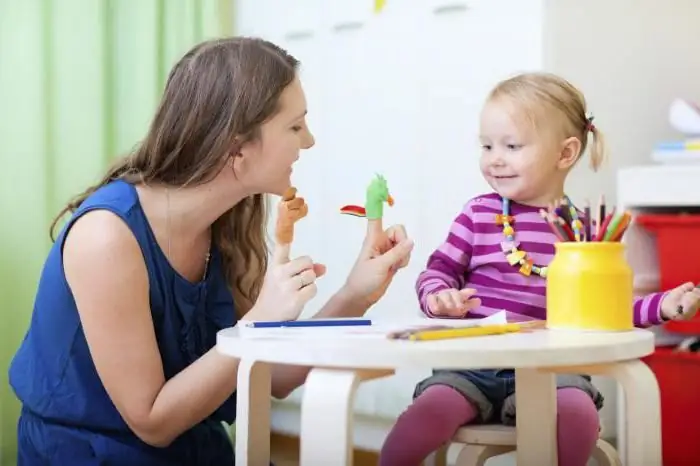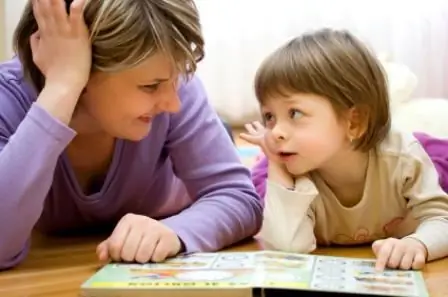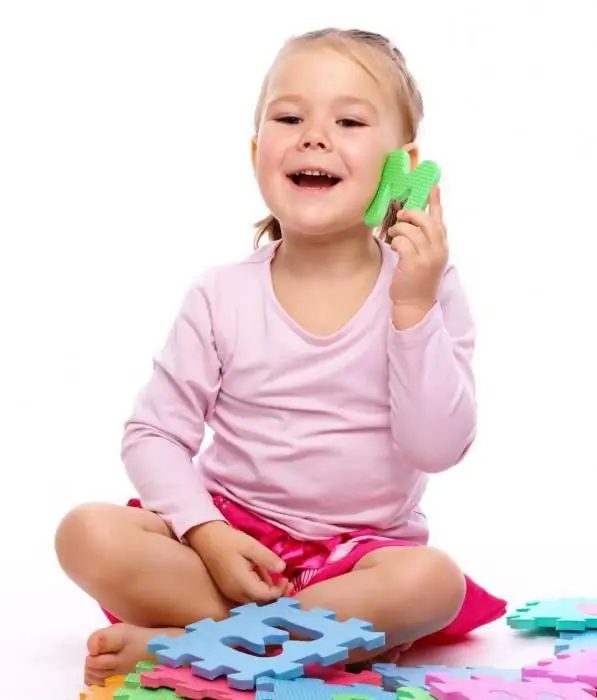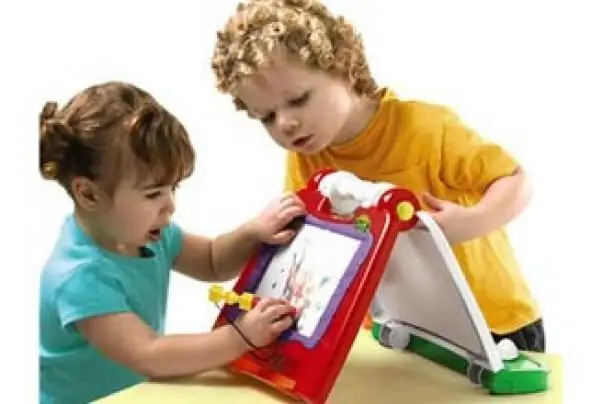2026 Author: Priscilla Miln | [email protected]. Last modified: 2025-01-22 17:55:21

Speech development of children is purely individual, but many parents ask themselves: "Is everything okay with my child?" Indeed, on the playground, children of the same age are strikingly different in vocabulary and clarity of speech. How do you know if your baby's speech is developing normally?
Distinguish between the child's active and passive vocabulary. The latter is formed already from birth - the baby remembers words and intonations, begins to understand their meaning. Later, an active vocabulary is formed - the child begins to pronounce words on his own: first sounds, then words and phrases. At first it is just a repetition of sounds after adults, then conscious communication with them - the words take on meaning. Even one sound in a baby from 1 to 1.5 years old can mean different emotions: for example, “Ah!” Said with different intonation means surprise, discontent, and a question. By the way, it is during this period of time that the vocabulary of the baby is practically not replenished. The speech development of preschool children is intensive anda very interesting process, but each child has his own characteristics.
One of the most important periods in the formation of a baby's speech is the age from birth to three years. Let us briefly describe the speech development of children at this time:

- 2 months. Separate, spontaneous sounds addressed to the mother;
- 3 months. Long vowels - "ah-ah", "uh-uh", "oh-oh-oh." Cooing, "cooing";
- 4 months. The cooing begins to turn into smooth chains of sounds, for example: “u-u-a-a-o”;
- 5 months. Beginning of babbling, melodic cooing, syllables and consonants appear in speech;
- 6 months. Babble continues (“yes-yes-yes”, “ma-ma-ma”). Imitation of audible sounds, conducting a "dialogue" with an adult;
- 7 months. The baby begins to understand the meaning of the words, babbling continues;
- 8 months. Echolalia appears - the child repeats sounds, imitating the conversation of adults. Babble turns to communication;
- 9 months. The complication of babble and the appearance of the first two-syllable words "ma-ma", "ba-ba";
- 10-12 months. The number of understood words, new syllables increases. The first simple words "na", etc., which can replace whole phrases. By the age of one, the child easily imitates adults when he hears something new.
Advance or delay in speech development by 1-2 months under the age of one year does not play a special role.

The speech development of children at two years old is different in that the child beginscorrelate the picture with the object depicted on it and the word that denotes it (shows a ball, tree, etc.). The child develops his own "dictionary" - a set of words (usually nouns) that he uses to tell you about his desires. Each child has his own set, because for the most part it consists of the names of those objects that he encounters every day.
Features of the speech development of children at the age of three are the coherent nature of speech, the appearance of sentences that gradually become more complicated. An interrogative intonation appears, repetitions of words are frequent, the child may stray - by the age of four this should pass. The vocabulary of a three-year-old is quite large - from one to one and a half thousand words. Words invented by children at this age, for example, “flycat”, etc., will make adults laugh
Speech development delay after three years is fraught with problems with reading, writing and thought processes in the future, that is, a general mental retardation. Therefore, if your baby is significantly behind the indicated norms, contact a specialist.
Recommended:
Raising a child (3-4 years old): psychology, tips. Features of the upbringing and development of children 3-4 years old. The main tasks of raising children 3-4 years old

Raising a child is an important and main task of parents, you need to be able to notice changes in the character and behavior of the baby in time and respond to them correctly. Love your children, take the time to answer all their "whys" and "what for", show care, and then they will listen to you. After all, the whole adult life depends on the upbringing of a child at this age
Speech therapy classes for children (2-3 years old) at home. Speech therapist classes with children 2-3 years old

When a child at 2-3 years old does not speak, parents panic. It seems to them that if the neighboring children speak very well, then their baby is lagging behind in development. However, it is not. Speech therapists say that each child is individual. Non-speaking children can be taught at home. In this article, you can find exercises, tips and tricks that will help keep your child interested
What should a child know at 3? Age features of children 3 years old. The development of the speech of a child of 3 years

Most modern parents pay a lot of attention to the early development of children, realizing that up to three years the child learns easily during the game, and after that it becomes much more difficult for him to learn new information without a good initial base. And many adults face the question: what should a child know at 3 years old? You will learn the answer to it, as well as everything about the features of the development of children at this age from this article
Speech therapy classes with children 3-4 years old: features of the implementation. The speech of a child at 3-4 years old

Children learn to communicate with adults and speak in the first year of life, but not always a clear and competent pronunciation is achieved even by the age of five. The unanimous opinion of pediatricians, child psychologists and speech pathologists coincides: the child should limit access to computer games and, if possible, replace them with outdoor games, didactic materials and educational games: lotto, dominoes, mosaics, drawing, modeling, applications, etc. d
Where to give a child at 4 years old? Sports for children 4 years old. Drawing for children 4 years old

It's no secret that all adequate parents want the best for their child. And, of course, so that their precious children become the smartest and most talented. But not every adult understands that they have only one right - to love the baby. Very often this right is replaced by another - to decide, to order, to force, to manage. What is the result? But only that the child grows up depressed, insecure, indecisive, not having his own opinion

